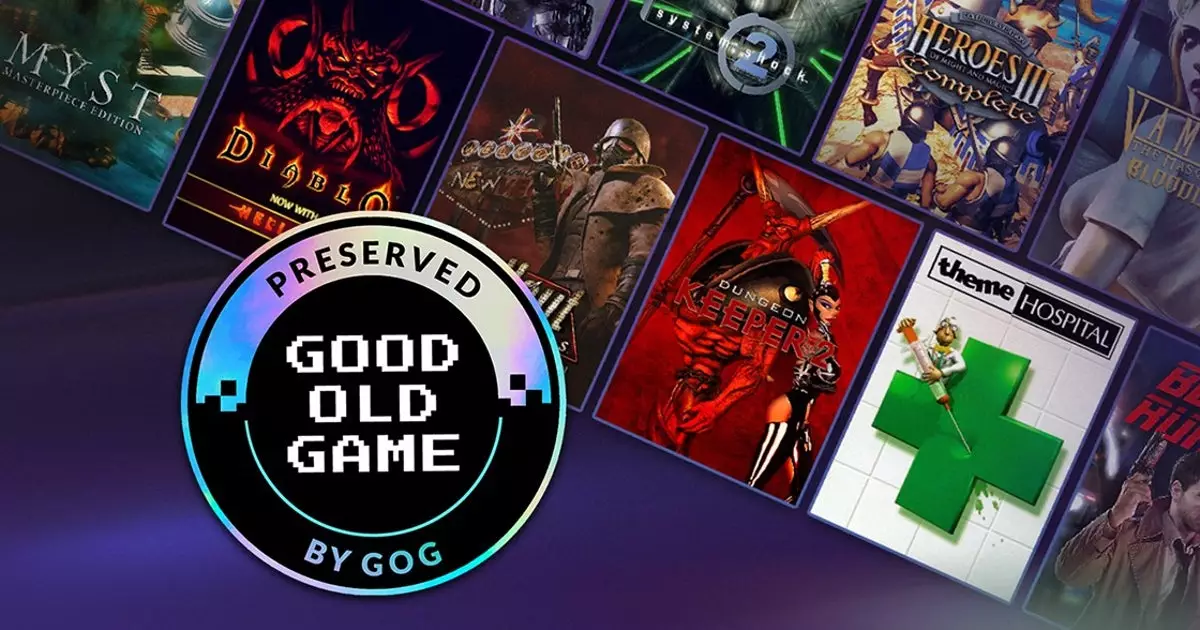In the realm of digital gaming, GOG.com (formerly known as Good Old Games) has carved a niche as a platform largely devoted to the preservation of classic titles. However, in recent years, the retailer has ventured beyond its original mission, expanding its offerings to include a wider array of modern blockbusters. This evolution can be viewed in two ways: as a commendable adaptation to an evolving market or a departure from the noble cause of preserving gaming history. As they tread this fine line, GOG has now introduced the GOG Preservation Program, signifying a return to their roots and a commitment to enhance gamers’ experiences with retro offerings on contemporary hardware.
The GOG Preservation Program is a testament to the platform’s new ambitions. By building from past efforts to restore older games, GOG aims to modernize these classics and provide users with enhanced compatibility with current systems. Games will be tagged with a distinctive “Good Old Game” badge, indicating that they have undergone meticulous scrutiny and modification—including bug fixes and the incorporation of contemporary features like updated video codecs and compatibility with Windows 10 and 11. This dual approach not only enhances the accessibility of these titles but also serves as a reassuring mechanism for gamers wary of incompatibility issues that can plague older games on modern hardware.
The catalog of over 100 titles currently being relaunched under this initiative already features beloved classics such as the Resident Evil series, System Shock 2, and the original Diablo. This revitalization encourages a new generation of gamers to engage with these historical gems while providing nostalgic players an updated experience. The matter of delivering the “most complete version available,” encompassing every available DLC, manual, and even diverse languages, only strengthens the appeal of GOG’s reimagined offerings.
Despite GOG’s enthusiasm for its Preservation Program, the reality of game restoration is fraught with logistical challenges. Probing the original code of classic titles typically requires authorization from the developers and publishers, a process that can be both time-consuming and tenuous. In the ever-evolving landscape of intellectual property rights and digital ownership, acquiring such permissions isn’t always straightforward. For a platform that serves both as a commercial operation and a custodian of gaming history, negotiating these complexities is critical.
While the economic incentive for GOG to resurrect these old titles is apparent—after all, they operate in a competitive marketplace dominated by players like Steam—there lies an ethical question about preservation versus profit. Questions linger over how to balance the need for revenue with the desire to ensure that classic games do not simply fade into oblivion. As gamers increasingly turn to GOG to find titles from their past, there lies a risk of commodifying nostalgia, ultimately undermining the intent behind preservation.
As technology advances at a breakneck speed, it can be easy to overlook the cultural importance of preserving games. Video games constitute a significant facet of contemporary cultural storytelling, mirroring the narratives found in film, literature, and music. The GOG Preservation Program not only strives to keep these older games alive but also reinforces their place within the broader narrative of gaming history. Allowing gamers to engage with and appreciate the evolution of gameplay, design, and storytelling provides depth to newer titles, enriching the gaming community as a whole.
It is encouraging to see GOG reclaim and advocate for game preservation at a time when many players feel disconnected from their gaming roots. As issues surrounding server shutdowns and digital rights emerge, this initiative is a timely reminder of the need for sustainable, offline-compatible gaming solutions.
GOG’s renewed direction could be a vital step in sustaining the legacy of classic games. The Preservation Program fosters not only accessible gameplay but also encourages conversations about the importance of preserving interactive experiences for future generations. While the undertaking may present its share of challenges, the prospect of continued development of preservation-friendly remasters promises a revitalized appreciation for gaming’s rich history. Opening pathways for developers and players alike to engage with both classic and contemporary titles, GOG’s journey toward exalted duality might be precisely the fusion the gaming landscape requires.

